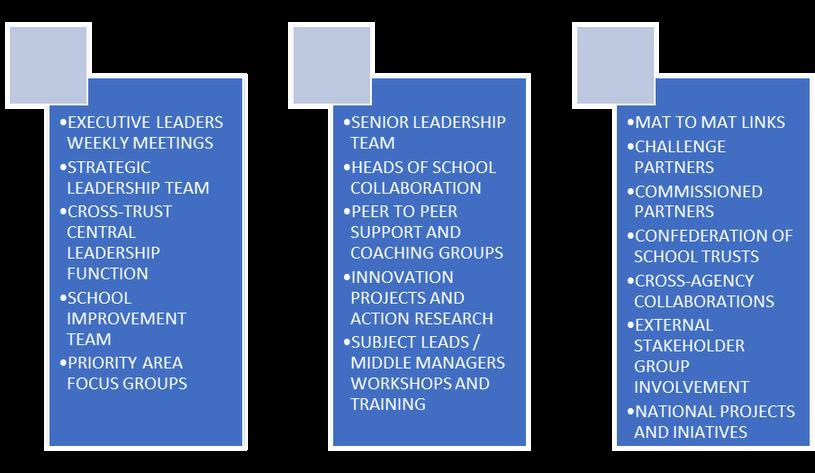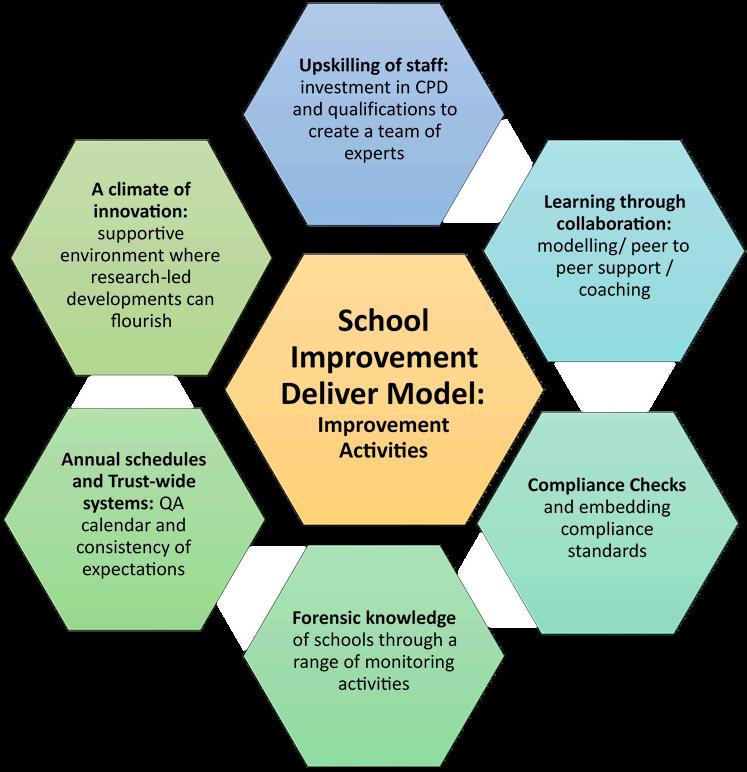




School improvement is our core business and drives our continuous commitment to high quality educational provision for all our pupils Our mission statement is “Excellence Every Day”. This is driven through our School Improvement Model and our growth strategy, where growth is understood to be not solely about scale, but also scope / reach, quality, impact and investment.
We are committed to a culture of ambition: “no excuses” and rejection of complacency sit at the heart of our trust ethos and drive our relentless desire for improvement on a daily basis.

Clearly communicate accountability and create a culture where everyone understands their value and the importance of their “ownership” and contribution. Open up a platform for constructive dialogue which encourages participation and healthy challenge
Promote growth for inspirational leadership at all levels to encourage innovation. Exploit the advantages for collaboration presented by being part of a MAT.
Create a culture of courageous leadership across our ‘Trust where new ideas are welcomed and staff are enthused by being heard.
Harness talent and invest in developing staff at every level and in every area of the organisation to build a sustainable staff resource.
Secure healthy retention rates through the valuing of staff: the widening of opportunities and investment in CPD as well as a sensible approach to staff wellbeing and workload.
Deliver high quality CPD, support staff in gaining further qualifications and promote active research to ensure our people are ambitious for themselves and the organisation.
Develop our People Strategy further to ensure staff experience quality assurance and appraisal in the context of partnership with a “critical friend”, communicating our commitment to valuing career pathways for staff and ensuring they know there are opportunities with our trust for a long term career
Deliver our vision through the combination of a holistic curriculum alongside outstanding teaching which ensures out pupils receive the highest quality provision and engage in learning opportunities beyond their lived experiences
We put children at the heart of all decision making
We empower our leaders with agency and support to tackle persistent challenges and lead improvement journeys in their schools.
We build capacity – it sits at the heart of our improvement journey: how we establish systems to allow our staff to work smarter and manage their time better, how we develop talent and how we encourage collaboration to streamline and reduce duplication to free up time and energy for research and development.
We build success on agile thinking and operational management coupled with resilience to lead and drive school improvement.
We forward plan strategically in all areas of our Trust and School Improvement and People Strategy
We adopt a systemic approach based on our learning and experiences, capturing the best habits and routines and exploiting collaboration.
We seek to have honest conversations about alignment, consistency and agreed Trust strategy alongside challenging debate about autonomy and the drivers behind this.
We are committed to making sure that no child or school is left behind and our Trust will consider the deployment of resources in effectively achieving our intent.
Our INTENT is:
that every pupil in our schools has access to a high quality educational offer which recognises difference but ensures that equality of opportunity is available to all.
that learning for our pupils is built around a sequential curriculum which promotes progress and prepares pupils for the next stage in their learning journey.
that our pupils are taught explicitly about the skills and attributes beyond the academic curriculum which help them to develop socially and emotionally and prepare for adult life as positive contributors to our future communities. that our pupils will access opportunities beyond their lived experiences and develop personal agency in making informed choices about their futures.
that our schools recognise their responsibilities to all pupils and make necessary adaptations and design bespoke interventions whereby our SEND strategy promotes inclusion through provision not people to help pupils overcome barriers to learning and progress.
that education is fun, exciting, motivational and rewarding and our pupils feel empowered to take risks, make mistakes and learn through exposure and experimentation.
We are unapologetically aspirational. We don’t accept excuses and we see our role to remove barriers and create the right environment for our pupils to flourish. Our mission of “Excellence Every Day” is directly linked to our commitment to equity and social inclusion.

We are committed to reducing variances between pupils through delivering a provision which widens horizons and embeds cultural capital throughout the curriculum.
Our School Improvement Strategy is built upon SEVEN KEY PILLARS:
• Our Teaching and Learning Philosophy
• Fast Feedback
• SEND and Inclusion: A commitment to inclusion through provision not people
• Our Curriculum Guarantee: A holistic educational experience
• Our People and Culture
• Keeping safe
• Coaching and Collaboration
Together, these areas combine to create our Trust commitment to “Excellence Every Day”.
Our expectation is that the schools in our trust work in partnership and share a commitment to raising standards. Each school is valued for its unique character and what it brings to the partnership – we do not seek schools which are duplicates of each other as we want them to bring their individual strengths to the partnership Each school is expected to contribute and work with their others, understanding that every child in our schools is a child in our Trust and our common commitment is to ensure that every child in every school is accessing “Excellence Every Day”
We recognise that schools are at different points on their improvement journey and that contexts can change which means that these points are not stagnant. Autonomy for decision-making in schools is given to leadership teams with the extent to which it is shared or withdrawn for a period of time based on the performance of the school and the level of support required.
Our Trust describes this relationship as “the golden elastic” which attaches each school to the Central / Executive Team. The “elastic” allows schools to move away or be pulled closer to the Central Hub depending on where the school is in terms of performance: pupil outcomes, quality of teaching, pupil progress, attendance, behaviour, exclusions and suspensions, variances between pupil cohorts, retention and progression of staff, engagement in Trust-wide initiatives and impact beyond the school itself This data is collated termly in our KPI Dashboard, Data Dashboard and Head Teacher reports each term.
Our Teaching and Learning Philosophy – Illuminate Minds Trust has a clearly defined teaching and learning philosophy which is constructed around strong subject knowledge, supportive learning environments, high expectations for learning, strategies to promote hard thinking and Quality First Teaching.
Fast Feedback – Responsive and timely dialogue with both pupils and staff which is “in the moment”. The purpose of this is to reduce time wasted, accelerate progress / improvement and address misconceptions or poor practice at the time.
SEND and Inclusion – Our expectation is that our schools are fully inclusive and promote the IMT values of “belonging” and “community”. We are committed to ensuring all pupils’ needs are met by focusing on quality provision and not accepting misconceived “quick wins” of allocating the least qualified member of staff to be working 1:1 with the pupils with the greatest level of need.
Our Curriculum Guarantee – We are committed to providing our pupils with an exciting, engaging curriculum which systematically builds on prior knowledge and is sequenced to secure solid progress. Equality, diversity and British Values are embedded within our curriculum model which is enhanced by live experiences through an emphasis on cultural capital.
OurPeopleandCulture–Ourcultureof“ExcellenceEveryDay”drivesanethosof“no excuses”,accountabilitybalancedwithsupportandaspiration Weareambitiousfor ourorganisation,ourpeopleandourpupils. OurTrustprioritisesinvestmentinCPDto ensurewearecontinuallyupskillingourstafftobethebesttheycanbeandseeking to provide them with opportunities and experiences as part of our commitment to strategic succession planning. We present our staff with long term career opportunitieswithintheIlluminateMindsTrust.
Keeping Safe – Our highly specialist leadership team drive a culture of robust safeguarding where keeping children safe is everyone’s responsibility. Vigilance and curiosity are at the heart of our approach alongside compliance with health and safety and educating our children about how they keep themselves safe.
Coaching and Collaboration – Our Trust is about unity, exploiting opportunities to work together and being comfortable and secure in having challenging conversations to drive improvement We are committed to a coaching culture where all staff engage regularly in coaching conversations, model and undertake peer reviews both within our Trust and beyond through relationships with Challenge Partners and commissioned school improvement experts
Our School Improvement Strategy is built around our ambition for “Excellence Every Day”.
Our strategy aims to enable each school to develop and sustain their capacity for improvement. It is intrinsically linked to our Growing Ambition: Staff Development Strategy For Illuminate Minds, putting children at the heart of everything we do is a non-negotiable. However, we recognise that in order to provide our pupils with the highest quality educational offer investment in our staff and their growth is key. Providing our pupils with the highest standards of teaching and learning and supporting their personal development are central to our School Improvement Strategy
Our approach to school improvement is firmly situated within the concept of strong collaboration so that the skills and talents that exist within the Trust’s schools can be shared and benefit all our pupils It is informed by evidence-based models and current educational research. The Trust is a member of The Confederation of Schools Trust (CST). This ensures we keep pace with the latest research and evidence to inform our schools' improvement.
Educational improvement is a never ending journey. We know that schools which believe they have “arrived” and sit still will naturally eventually slip backwards. Therefore, our expectation is that all of our schools actively engage in school improvement and seek to continually aim higher. We believe in innovation, cocreation and collaboration, practical advice and practitioner modelling. We encourage an outward-facing approach, not only in terms of research and development, but also in terms of schools building relationships both within and beyond the trust to see different approaches and understand how schools tackle specific issues and secure improvement.
We recognise that every school has its strengths and there is much to celebrate in every school but each one will be at a different stage on their improvement journey We also recognise schools can be impacted by significant barriers along the way and our school improvement approach will remain evidence-informed, responsive and proportionate to a school’s improvement needs over time. This approach allows the Trust to build and strengthen our capacity to support more schools either through growth or partnership arrangements.
In assessing school improvement capacity, we consider these five fundamentals as identified in Knowledge-Building, School Improvement at Scale 2021:
Fast Feedback – Responsive and timely dialogue with both pupils and staff which is “in the moment” The purpose of this is to reduce time wasted, accelerate progress / improvement and address misconceptions or poor practiceatthetime.
Establishing school improvement capacity.
Undertaking forensic analysis of school improvement.
Supporting and deploying leadership.
Providing access to expert practice and expertise.
Monitoring improvements and measuring impact – assessing the quality of provision and pupil outcome.

Our model has a tiered approach to school improvement but equally recognises that there has to be fluidity between the stages to allow for bespoke support and targeted interventions which are built around a forensic knowledge of the school and its context.
Requires significant improvement to the quality of education and / or safeguardingwithlimitedleadershipcapacitytoimprove.
No foundations to the values or vision – words only rather than embedded cultureandexpectations.
Lackofclarityaroundstaffrolesandresponsibilities.
Staff wellbeing compromised by poor communication and lack of clarity fromleadership
Crisisorresponsivemanagementandnoforward-planning.
Limitedprocedures,systems,strategiesand/orpolicies.
Ineffectivesafeguardingpractices.
Unclear systems for managing behaviour and promoting positive relationships.
Confusedandineffectivegovernance
Disjointedengagementwithparents.
Narrowedcurriculumoffer
Noteachingandlearningphilosophy.
Leaders in place to establish culture, expectations, ethos and standardsanddelivertheTrustvision.
Leadersestablishcontrolandoperationalmanagementoftheschool.
Improvement at pace – a methodical approach to school improvement with targetedactionplanreviewedeveryhalfterm
Highleadershipvisibilityanddirection
Beginningsofdistributedleadershipwithtightcontrolsandmonitoringsystems. Clear roles and responsibilities communicated through a review of job descriptionsandorganigrams.
Establishmentofpoliciesandprocedures,systemsandprocesses.
Planningahead–movingawayfromreactivedecision-making
Improving outcomes for pupils: setting high expectations of attendance and progress and providing staff with the necessary training and support to facilitatethis.
Non-negotiablesarebeingdevelopedtoensureconsistency
Staff are in the process of being upskilled to deliver the inclusive SEND strategyofthetrust
Devisinganappropriatecurriculummodelwhereintent,implementationand impactourclearlyarticulated.
Interveningtoensuregovernancecompliancethroughsystemsandpolicies.
Buildingrelationshipswithstakeholders.
PHASE 2: REPAIR PHASE 2: REPAIR
Increased distribution of roles and responsibilities, greater leadership development of others with the vision and culture embedded throughout the school School able to engage in collaboration and school to school support.
Embedding of systems and procedures.
Policies well understood by all.
Well-thought out curriculum model with clarity of intent, implementation and impact articulated to all
Capacity strengthened through succession planning strategy
Staff development is planned and scheduled throughout the year and links to the school development plan.
Teaching and Learning Philosophy is well understood and expectations of all are clear
Monitoring schedule is in place
Fast Feedback – Responsive and timely dialogue with both pupils and staff which is “in the moment” The purpose of this is to reduce time wasted, accelerate progress / improvement and address misconceptions or poor practiceatthetime.
Structured conversations to raise attainment take place half termly
Inclusive approaches are valued and recognised as a non-negotiable.
The SEND strategy is being led effectively in the school and staff are developing confidence and expertise in its delivery.
Robust self-evaluation which is distributed and includes the wider staff team in its development and equally is well communicated to all staff Outcomes for pupils are in line with national benchmarks.
Non-negotiables are established and understood.
Safeguarding is effective and safeguarding practices are embedded within the culture of the school
Strong communication with parents and other stakeholders Governance is compliant and challenging to drive improvement.
PHASE 3: IMPROVE
•Strongperformanceinallareas. ovation.
•Secureleadershipwhoprovideexcellentdirectionfortheschool.
•Strategicplanningisrobustandsystemsandproceduresarefullyembedded.
•Policiesareconsistentlyadheredto
• Model of good practice across the trust and with capacity to share expertise with others
•Talentmanagementandcareerpathwaysareembeddedinthe3-5yearplanforthe school.
•Safeguardingiswoventhroughoutallpractices.
•Outcomesforpupilsareexceptionalandabovenationalbenchmarks.
•Inclusionisattheheartoftheschool’sculture.
• The SEND strategy is fully embedded and there is little to no variance in the performanceofdifferentgroups
•Strongperformanceofpupilsandstaff.
• Capacity within the school to lead on specific school improvement areas and offer supportbeyondthetrust.
• Governance is strong and drives continual improvement through challenge, engagementandjointstrategicplanningwithseniorleaders.
Quality assurance is multi-faceted and is adapted to meet the changing needs of our schools. However, the core assurance model which operates in all of our schools is built on a combination of:
Daily leadership walks (internal) – daily
Internal subject reviews - fortnightly
Leadership walks (Trust School Improvement Team) – minimum of one day per week
Focused subject review days (Trust School Improvement Teams) - Termly
Raising Attainment termly meetings – termly
Commissioned focused improvement reviews – termly
Annual external review (Challenge Partners).
Annual safeguarding reviews (Trust Director of SEND, Safeguarding and Inclusion) - annually (internal / external).
Coaching Groups / Peer Reviews - Twice half termly.

•Interveningtoensuregovernancecompliancethroughsystemsandpolicies.
The Trust Quality Assurance Framework outlines how the Trust supports and holds schools to account through scheduled reviews across key areas including compliance, safeguarding, teaching and learning, attainment and data / KPI reviews and stakeholder “temperature checks”.

Effective school improvement is built on a careful balance between support and challenge. Feedback and open dialogue are key in ensuring this remains a participative process where staff are always at the centre.






All schools in our Trust and those joining the Trust will access our core school improvement offer which is outlined below. Central to this is our universal and targeted Professional Development Programme
Those schools who require additional support who at Phase 1 or Phase 2 access the core offer and enhanced support through a bespoke programme co-created with the Head Teacher in response to a forensic review and agreed action plan. Expertise from both within the trust and externally through professional partners will be used to work alongside the leadership team to drive rapid improvement.
The core offer includes:
The CEO will visit each school at least once every two to three weeks, with interim virtual and telephone support. Working with the Trust Director of School Improvement, they will provide support and challenge, celebrate success and broker any additional support for school improvement. Visits will include joint learning walks with the Heads of School, capturing staff and pupil feedback and reviewing pupil outcomes. The CEO will work with the Trust Director of School Improvement to identify and build additional capacity to support Heads of School as required and the Trust Director of School Improvement will review the school development plan half termly.
Heads of School will meet weekly with the executive leadership team including the CEO to review progress and impact and identify risks and ways to overcome barriers.
Schools participate in Challenge Partners, a national network of more than 550 schools and more than 100 trusts, to support improvement through peer review, working together, to combine expertise.
An experienced, expert central executive team work alongside school leaders to guide, coach and support leadership and school improvement. The Trust’s executive leaders provide weekly on-site support and challenge for each school. The team offers expertise to support school improvement including curriculum delivery, teaching and learning, SEND and inclusion, training, safeguarding, people development, school operations and health and safety.
To assure consistent quality improvement, schools at each stage of their development participate in our independent external review process. Education, safety, SEND and safeguarding reviews are brokered by the Trust provided by experts, to enable quality assurance, accurate self-reflection and evaluation.
The Trust deploys a range of IT solutions and management information systems (MIS) to support leaders with school improvement. Trust leaders retain significant expertise and provide on-site support each week to train and help staff to embed these systems, to enable school improvement, reduce workload and inform diagnosis and improvement planning.
To support learning and development, all our people benefit from high-quality individual performance development (appraisals) to support and plan career pathways and professional development.
Leadership work with the staff team to identify succession planning routes and opportunities to capture talent.
We offer a Trust-wide comprehensive staff benefit package with an enhanced reward and wellbeing support including access to a 24 hour employee assistance line and telephone medical advice.
Opportunities for staff to contribute and feedback through staff surveys, “leadership surgeries”, daily briefing meetings, weekly staff meetings and collaborative working parties.
All schools have access to our ‘Training and Development Programme’. The annual programme schedule is confirmed termly but in draft form for the year to allow for some flexibility and a responsive approach. There is also a directory of development opportunities which is reviewed annually and outlines courses, accredited programmes and how to access support across the trust.
The trust operates a coaching culture and coaching groups are established in our schools. There are also opportunities for individual coaching with our trained coaches by request and as part of individual career pathways.
Peer to peer support through professional networks, year group and subject meetings and on-going virtual support as well as modelling good practice support are available to all.
All opportunities are advertised internally.
All schools engage and contribute to the Trust’s established governance model and future development.
Heads of School are members of the Trust’s Executive Team to ensure school improvement and pupil outcomes remain at the heart of decision-making and strategicplanning.
Heads of School provide and present termly reports to the Local Advisory.
•Interveningtoensuregovernancecompliancethroughsystemsandpolicies.
• Our Trust has a defined operating model with common approaches for policy development and provision of shared centralised services. The Illuminate Minds Trust sets out clear parameters where schools and services are expected to align with the Trust, its policies and activities and where they can maintain autonomy to suit their specific contexts. This operating model applies to all schools to enable:
Leaders to focus on school improvement
Economies-of-scale and value for money
Examples of our enhanced support (“Intensive Care Programme”) offer may include:
Mentoring for the school leaders with planned programmes of individualised support; Enhanced support or intervention from the Trust’s Executive Team, or other commissioned specialists, brokered by the Trust Teaching and Learning Lead, Trust Director of Safeguarding, SEND and Inclusion and / or the CEO.
The Trust may broker a National or Senior Leader of Education (NLE/SLE) from a similar contextual setting or with appropriate experience. The CEO (NLE) or Director of School Improvement or Director of SEND, Safeguarding and Inclusion may be based in school on a weekly basis to work alongside the Head Teacher and leadership team.
The Trust Teaching and Learning Lead will provide direct on-site support to the leadership team over a set period of time for up to 4 days per week.
A tailored CPD programme to rapidly upskill staff in specifically identified areas.
An “Intensive Care Programme” (ICP) with fortnightly review against a co-created action plan. The programme may operate for an agreed period of between 3 – 12 months.

TrustDirectorof School Improvement
PhonicsandEarly ReadingLead
Externally commissioned partners
TrustDirectorof SEND,Safeguarding andInclusion Researchand DevelopmentLead
•Interveningtoensuregovernancecompliancethroughsystemsandpolicies.